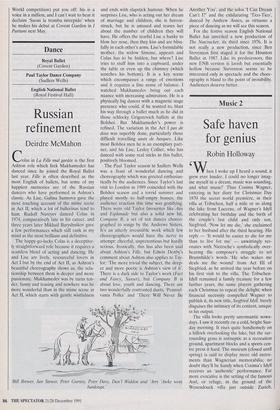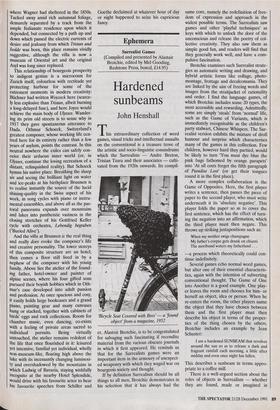Music 2
Safe haven for genius
Robin Holloway
When I woke up I heard a sound, it grew ever louder, I could no longer imag- ine myself in a dream, music was sounding, and what music!' Thus Cosima Wagner, entering in her diary for Christmas Day 1870 the secret world premiere, in their villa at Tribschen, half a mile or so along the lake from Lucerne, of Wagner's Idyll celebrating her birthday and the birth of the couple's last child and only son, Siegfried. 'Now let me die,' she exclaimed to her husband after the third hearing. His reply — 'It would be easier to die for me than to live for me' — unwittingly res- onates with Nietzsche's symbolically over- hearing the composer's struggle to set Brunnhilde's words 'He who wakes me deals me the wound' from Act III of Siegfried, as he arrived the year before on his first visit to the villa. The Tribschen- Idyll remained a family treasure for a few further years, the same players gathering each Christmas to repeat the delight; when financial necessity compelled Wagner to publish it, its new title, Siegfried Idyll, barely disguises the intimacy of its content, unique in his output.
The villa looks pretty unromantic nowa- days. I saw it recently on a cold, bright Sun- day morning. It rises quite handsomely on a hillock overlooking the lake, but the sur- rounding grass is antiseptic as a recreation ground, apartment blocks and a sports cen- tre press it hard. The museum (closed until spring) is said to display more old instru- ments than Wagnerian memorabilia; no doubt they'll be handy when Cosima's Idyll receives an 'authentic' performance. Far more evocative is the setting of the famous Asyl, or refuge, in the ground of the Wesendouck villa just outside Zurich, where Wagner had sheltered in the 1850s. Tucked away amid rich autumnal foliage, demurely separated by a track from the ample Italianate residence upon which it depended, but connected by a path up and down which passed the electric currents of desire and jealousy from which Tristan and Iso1de was born, this place remains vividly suggestive, although the villa is now a museum of Oriental art and the original Asyl was long since replaced.
This relationship of bourgeois prosperity to indigent genius is a microcosm for Zurich itself, colourless with rectitude yet protecting harbour for some of the extremest moments in modern creativity: Biichner had written Woyzeck here (scarce- ly less explosive than Tristan, albeit burning a long-delayed fuse), and here Joyce would achieve the main body of Ulysses. Wander- ing its prim old streets is to sense why in 1917 they gave spontaneous utterance to Dada. Othmar Schoeck, Switzerland's greatest composer, whose working life cen- tred here for its entirety rather than a few years of asylum, points the contrast. In this neutral nowhere the exiles can safely con- ceive their arduous inner world (or, in Ulysses, continue the loving recreation of a distant, relinquished reality). But Schoeck hymns his native place. Breathing the sharp air and seeing the brilliant light on water and ice-peaks at his birthplace Brunnen is to realise instantly the source of the lucid shining-quality in the Swiss aspect of his work, in song cycles with piano or instru- mental ensembles, and above all as the pas- toral panorama expands over mountains and lakes into pantheistic vastness in the closing stretches of his Gottfried Keller cycle with orchestra, Lebendig begraben (`Buried Alive').
And the villa at Brunnen is the real thing and really does evoke the composer's life and creative personality. The lower storeys of this composite structure are an hotel; then comes a floor still lived in by a nephew of the composer with his young family. Above lies the atelier of the found- ing father, hotel-owner and painter of alpine scenes, where his four gifted sons Pursued their boyish hobbies which in Oth- mar's case developed into adult passion and profession. At once spacious and cosy, it easily holds large bookcases and a grand piano, painting gear and many canvases hung or stacked, together with cabinets of birds' eggs and rock collections. Room for chamber music, even dancing, co-exists with a feeling of private areas sacred to individual pursuits. Being virtually untouched, the atelier remains redolent of the life that once flourished in it: leisured Yet intensive, familial yet individual, wholly non-museum-like, floating high above the lake with its incessantly changing luminosi- ty and overshadowed by the mountains in which Ludwig of Bavaria, staying wishfully incognito at the nearby Hotel Splendide, would drive with his favourite actor to hear his favourite speeches from Schiller and Goethe declaimed at whatever hour of day or night happened to seize his capricious fancy.











































































































 Previous page
Previous page